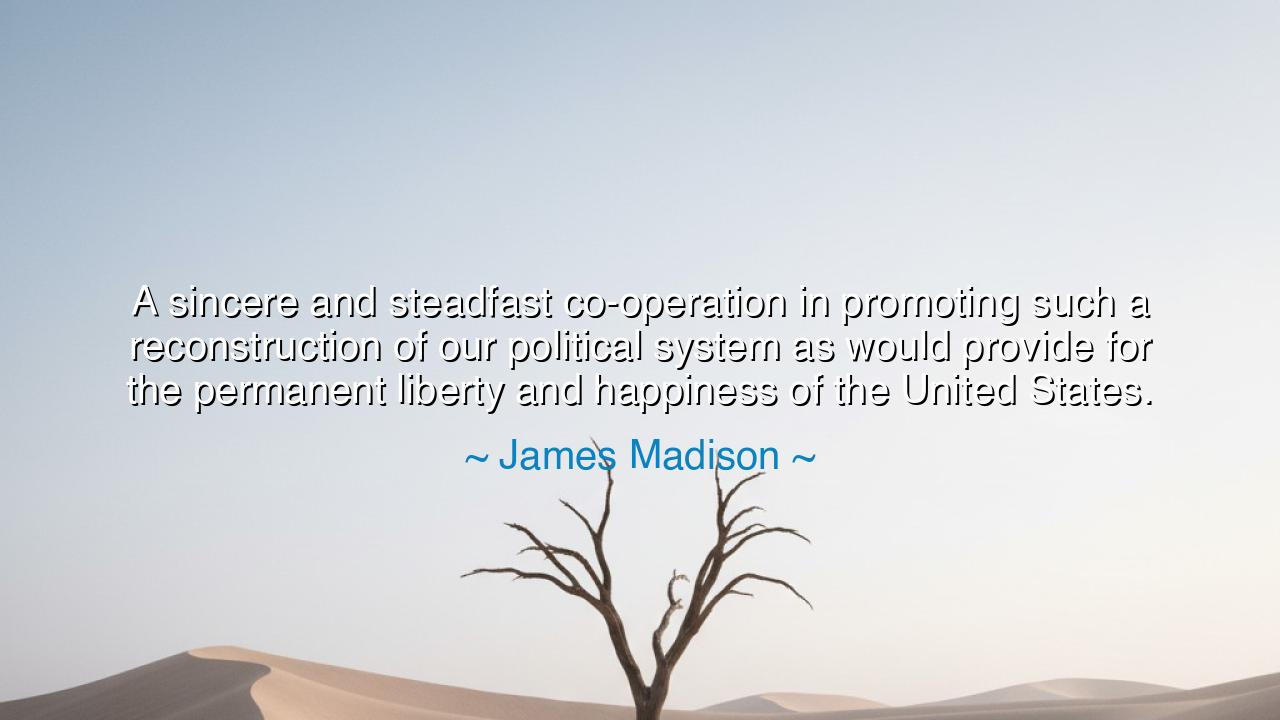
A sincere and steadfast co-operation in promoting such a
A sincere and steadfast co-operation in promoting such a reconstruction of our political system as would provide for the permanent liberty and happiness of the United States.






“A sincere and steadfast co-operation in promoting such a reconstruction of our political system as would provide for the permanent liberty and happiness of the United States.” Thus spoke James Madison, the quiet architect of freedom, the philosopher of the American experiment, and one of the great minds that shaped a nation from the dust of revolution. His words are both a plea and a promise — a reminder that the liberty and happiness of a people are not gifts bestowed once and forever, but living creations, requiring the constant co-operation and vigilance of those who would preserve them. In this declaration, Madison calls not for rebellion, but for renewal — a reconstruction of the political order through wisdom, unity, and faith in reason, that the fragile flame of democracy might burn eternal.
The origin of this quote lies in the turbulent years following the American Revolution, when the new republic, though victorious in war, trembled under the weight of its own freedom. The Articles of Confederation, the first framework of government, had proven too weak to bind the young states together. Trade faltered, debts mounted, and factionalism grew like a shadow across the land. It was in this moment of uncertainty that Madison, alongside his peers — Washington, Hamilton, Franklin, and others — saw the urgent need for reconstruction. Not destruction, but renewal: to forge a stronger, wiser system that could safeguard the permanent liberty of the people and the enduring happiness of the Union.
In those days, the word co-operation carried profound weight. It meant not merely agreement, but the meeting of minds and hearts — the willingness to rise above self-interest for the good of all. Madison knew that the Republic’s survival would depend not on the brilliance of one man, nor on the power of one faction, but on the steadfast union of many. “A sincere and steadfast co-operation,” he wrote, calling for patience, humility, and courage in the face of discord. For democracy, as he understood it, is not the easy path of passion or impulse, but the disciplined labor of compromise — the sacred art of building together what cannot be built alone.
It was this spirit of co-operation that gave birth to the Constitution of the United States, that enduring testament to reasoned liberty. In the summer heat of 1787, within the walls of Independence Hall, men of different temperaments, regions, and beliefs labored for months to craft a new foundation for their country. There were fierce debates, moments of despair, and tempests of ideology. Yet through persistence and faith, they achieved what the world had not thought possible — a political system born not from conquest or monarchy, but from deliberation and consent. Madison, as chief architect, did not seek perfection, for he knew none could be achieved. Instead, he sought balance — a system of checks and powers designed to preserve liberty against tyranny and chaos alike.
Madison’s vision, however, extended beyond the parchment of law. When he spoke of “permanent liberty and happiness,” he meant not merely political stability, but moral integrity — a people who would live free not only in their rights, but in their hearts. He understood that government alone cannot bestow happiness; it can only create the conditions in which the spirit of a nation might flourish. The true strength of a republic lies not in its rulers but in its citizens — in their capacity for virtue, their devotion to truth, and their willingness to labor for the good of all. Thus, liberty and happiness are not inherited; they are earned anew by each generation through conscious effort and steadfast co-operation.
History offers countless examples of this truth. In the century after Madison’s time, the Union he helped to build would again face division and bloodshed. Yet each time the Republic faltered — in civil war, in economic turmoil, in social struggle — it was reborn through the courage of its people to reconstruct and renew. From the abolitionists who fought for freedom, to the reformers who demanded justice, to the citizens who stood for equality in the face of fear — each answered Madison’s call to “promote reconstruction” for the sake of liberty. And each time, America proved that the work of freedom is never finished, that the nation must ever strive to live up to its founding promise.
Therefore, dear listener, take this wisdom as a charge to your own age. The world changes, yet the principle remains: liberty must be maintained through unity, and happiness through service. Do not grow weary of the work of reconstruction — in your community, in your nation, and within your own heart. Let your co-operation with others be sincere; let your commitment to truth be steadfast. For democracy, like a garden, withers without care. It demands that men and women sow seeds of understanding, even in the soil of disagreement.
For as James Madison teaches, the survival of freedom depends not merely on the strength of its institutions, but on the character of its people. When citizens unite in sincere and steadfast co-operation to preserve justice, to uphold truth, and to serve something greater than themselves, then — and only then — will the permanent liberty and happiness of the republic endure. Let this be the lesson carried forward: that the truest patriotism is not pride, but participation; not conquest, but co-operation. And through such unity of purpose, the light of liberty shall not fade from this world.






AAdministratorAdministrator
Welcome, honored guests. Please leave a comment, we will respond soon